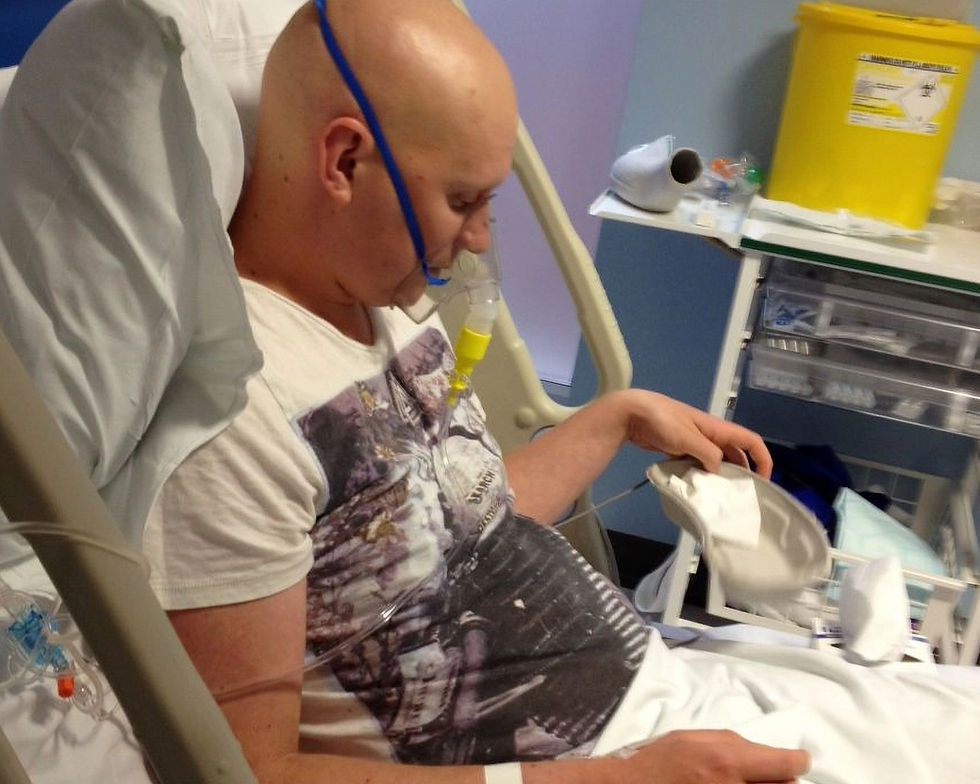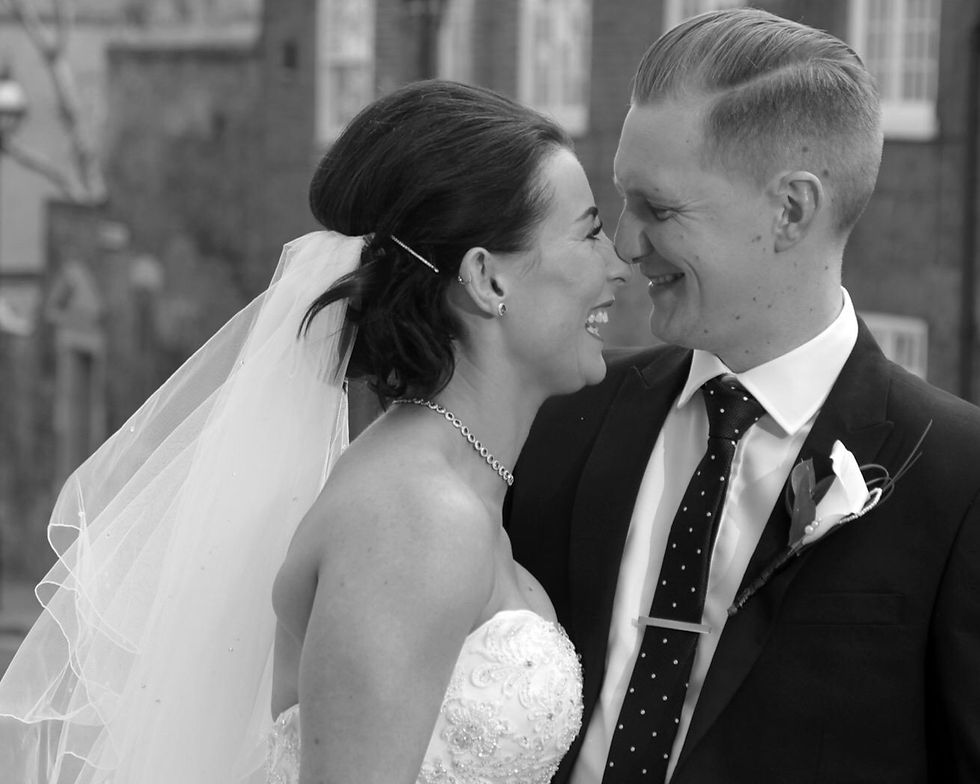How exercise gave me purpose and helped me rebuild after Cancer.
- Nikky Gibbons
- Jul 22, 2025
- 5 min read
A Journey marked by pain, resilience and hard choices.
I was twenty-six the first time I was told I had cancer and by the time I hit thirty-two, I'd have beaten cancer twice in 5 years: Ewing's Sarcoma, a rare type of bone cancer.
15.12.11, will always be a date etched in memory. It was a year after I first felt pain whilst running, and after numerous scans, biopsies and tests, there it was, a very small tumour in my toe. A tumour that would require six chemotherapy cycles, surgery, and then a further eight cycles of chemotherapy to complete the treatment. What followed was the darkest 12 months of my life and a time when friends and family meant everything, and resilience barely scratches the surface of what it took to get through.

Cue February 2016, life was moving forward. Jen, my now-wife, and I were relaxing one evening, planning our wedding. Then it happened again: the pain was back. Deep in the middle of the bone in my left foot. MRIs followed, and despite reports showing very small changes, no cause for concern; a biopsy was scheduled and life propelled itself towards the 'Big Day'
30th April 2016 was an amazing day for everyone. Jen looked stunning, and our honeymoon in New York and Mexico was just what we both needed.

Fast forward to December. The biopsy confirmed it: the cancer had returned. Surgery was necessary, and amputation was the best option.. I chose below the knee, as it would give me back the most mobility and in hindsight, the best decision I could have made. What followed was brutal, setbacks, dark moments, infections that saw me in intensive care... but this isn't about that. This is about what came next and what changed my life.
Rebuilding – One actual step at a time.
Eleven weeks post-surgery, I received my first prosthetic. I expected it to feel like my leg, and quite simply it didn’t. I honestly don’t know how I thought it would feel, but it wasn’t this. I’d forgotten how to walk. Why couldn’t I walk? My first physio crushed me. But I went back, again and again. Slowly but surely, the progress came.
Don't get me wrong, I was still in great pain, and the prosthetic didn’t feel normal, but I was walking. Again. Stairs, sticks, strengthening exercises, I committed to all of it. I was going to the gym 3 to 4 times a week and for a time, I was starting to feel in a good place.
My dad once told me that your life will resemble a book, broken down into chapters.
For me, this was Chapter three: The road to recovery.
Like most people, I assumed that as soon as I had my prosthetic leg, that would be it. I'd be running marathons in no time, back to normal and pain free. Not quite. The harsh reality? This was just the very beginning of a long and frustrating chapter. But I remember the moment I realised: this is my chapter to write, and it’ll be one I’ll never forget.
Embrace the uncertainty. When nothing is certain, anything is possible.
Recovery Redefined: Finding strength through movement.
The part that you're not prepared for is the mental recovery. I was struggling, I felt low, frustrated with life, bitter, like the world owed me something. But I shouldn’t have felt like that. I’d just beaten cancer; I had my life back. ‘I’m fine. ’ I wasn't fine. Not even close.
With the support of friends and family, I realised I needed help. I started seeing a psychologist, and through that work, I discovered one of the most powerful coping mechanisms for me: exercise.
At the beginning, having beaten cancer the first time, training was a form of escapism. When I ran, all I thought about was the road ahead, the miles left to complete, the burning in my lungs and in my legs, and how I wouldn’t be beaten. Cancer no longer had a place in my thoughts. As long as I had my headphones in, music playing, and a long, clear road ahead of me, I could escape. But running quickly became more than that. It gave me purpose. It gave me a goal. Something to focus on, something to achieve. And when I achieved those goals, I felt proud.
The London Marathon.
Choosing to commit to something as big as a marathon meant everything had to change.
It promoted some much-needed positive habits:
In my brain – releasing endorphins, boosting mood.
In my diet - eating better to fuel my runs.
In my lifestyle – cutting back on alcohol, because it’s hard enough to run 18 miles on a Sunday morning, let alone after a skinful the night before!!
In my sleep – I was sleeping more and sleeping better.
I ran the London Marathon in 2014, and to this day, it’s still the greatest experience of my life.
Exercise helped me cope with my second diagnosis and my amputation. It still helps me cope with the uncertainties cancer has left behind. Granted, I don’t run as much these days, and I really miss it — but that doesn’t mean I’ve lost my sense of purpose. I have more.
More drive. More focus. More determination to do the things I used to do.
I have down days like everyone, Days when I don’t train. Days when I don’t feel like doing anything. But then I remind myself how lucky I am to still be here, to still move, to do all the things I enjoy, and just how close I have been to losing all of it. My battle with cancer will always be part of me, but for the most part, it’s out of my control. What is in my control is how I respond, and exercise gives me the physical and mental strength to keep fighting.
And here I am today. Purpose found.
Today, I've put everything I’ve been through, everything I’ve learned, into being co-founder of The Fitness Collective, our small group personal training gym.
But this gym isn’t just about physical goals; we see the person behind them.
We talk about our fitness community like it’s a marketing phrase. But it’s not. For us, it’s something that’s felt.
What we’ve built here is real. It’s the members, the coaches, the energy, the laughs. It’s the reason why, for many people, coming here is the best part of their day.
And that… that’s my sense of purpose.
Throughout everything, I’ve been lucky to receive incredible support, not least from the Bone Cancer Trust.
Their work goes beyond research. They provide hope, guidance, and strength during the darkest moments – and I’ll always be grateful for the role they played in mine.
Throughout his battle with Cancer, Nik created a blog, 'Bad to the Bone'
An open and honest account of his battle with bone cancer. You can read it here >> Bad to the Bone.
Exercise is the most underutilised form of antidepressant.
It's proven that physical activity is one of the most effective ways to improve mental health. Regular exercise can have a profoundly positive impact on depression and anxiety. It relieves stress, helps you sleep better and improves overall mood. I’m sure those who have exercised have at some point experienced an enormous sense of wellbeing. Exercise promotes all kinds of changes in the brain, including neural growth, reduced inflammation and new activity patterns that promote feelings of calm and wellbeing. It also releases endorphins, powerful chemicals in the brain that energize your spirits and make you feel good. Finally, exercise can also act as a distraction, allowing you to find some quiet time to break out of the cycle of negative thoughts that feed depression and anxiety.
The mental health benefits of exercise” – HelpGuide.org














